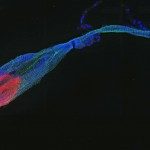Lien vers Pubmed [PMID] – 18688281
PLoS Pathog. 2008;4(8):e1000121
Plasmodium sporozoites are deposited in the skin by Anopheles mosquitoes. They then find their way to the liver, where they specifically invade hepatocytes in which they develop to yield merozoites infective to red blood cells. Relatively little is known of the molecular interactions during these initial obligatory phases of the infection. Recent data suggested that many of the inoculated sporozoites invade hepatocytes an hour or more after the infective bite. We hypothesised that this pre-invasive period in the mammalian host prepares sporozoites for successful hepatocyte infection. Therefore, the genes whose expression becomes modified prior to hepatocyte invasion would be those likely to code for proteins implicated in the subsequent events of invasion and development. We have used P. falciparum sporozoites and their natural host cells, primary human hepatocytes, in in vitro co-culture system as a model for the pre-invasive period. We first established that under co-culture conditions, sporozoites maintain infectivity for an hour or more, in contrast to a drastic loss in infectivity when hepatocytes were not included. Thus, a differential transcriptome of salivary gland sporozoites versus sporozoites co-cultured with hepatocytes was established using a pan-genomic P. falciparum microarray. The expression of 532 genes was found to have been up-regulated following co-culture. A fifth of these genes had no orthologues in the genomes of Plasmodium species used in rodent models of malaria. Quantitative RT-PCR analysis of a selection of 21 genes confirmed the reliability of the microarray data. Time-course analysis further indicated two patterns of up-regulation following sporozoite co-culture, one transient and the other sustained, suggesting roles in hepatocyte invasion and liver stage development, respectively. This was supported by functional studies of four hitherto uncharacterized proteins of which two were shown to be sporozoite surface proteins involved in hepatocyte invasion, while the other two were predominantly expressed during hepatic parasite development. The genome-wide up-regulation of expression observed supports the hypothesis that the shift from the mosquito to the mammalian host contributes to activate quiescent salivary gland sporozoites into a state of readiness for the hepatic stages. Functional studies on four of the up-regulated genes validated our approach as one means to determine the repertoire of proteins implicated during the early events of the Plasmodium infection, and in this case that of P. falciparum, the species responsible for the severest forms of malaria.

